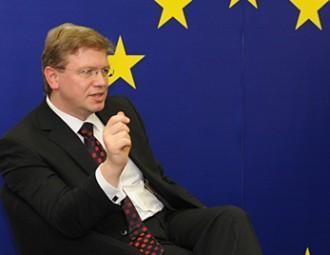Belarus-EU relations depend on the decision on political prisoners, Stefan Füle says

The European Commissioner for Enlargement and European Neighbourhood Policy has commented on the prospects of EU development programmes in Belarus.
The prospects of EU-Belarus relations are great but they depend on the Belarusian authorities’ decision concerning political prisoners, European Commissioner for Enlargement and European Neighbourhood Policy Štefan Füle told Belarusian journalists at the Eastern Partnership summit in Vilnius.
- You said that you believed in the programme Dialogue on Modernisation with Belarus a year ago. How do you assess relations with Belarus now and what prospects can you see?
- The prospects are great. They only depend on the Belarusian authorities’ decision concerning political prisoners. The European Unions’ policy is absolutely clear. As soon as there are no political prisoners and they are acquitted, the European Union will be ready to build up steady bilateral relations with Belarus and discuss the reform of the programme and the support of the modernization of Belarus according to the Belarusian people’s aspirations.
- However, the Belarusian authorities do not seem to be interested in the dialogue itself and in the Eastern Partnership. What can be done about it?
- The dialogue continues. We agree with the civil community that the Dialogue on Modernisation is a good platform for our dialogue and the joint work with the civil community as well as a suggestion for the government. Having made the suggestions, we are waiting for the government’s response. I think that it would be beneficial for everyone: for the Dialogue on Modernisation and for the whole Belarus because it is not a dialogue for the sake of a dialogue. Its goal is clear: to prepare a modernisation programme. As soon as the conditions for it are met, we can start realising it step by step for the good of Belarus and its citizens.
The interview was originally published at Euroradio.
-
03.01
-
07.10
-
22.09
-
17.08
-
12.08
-
30.09








































